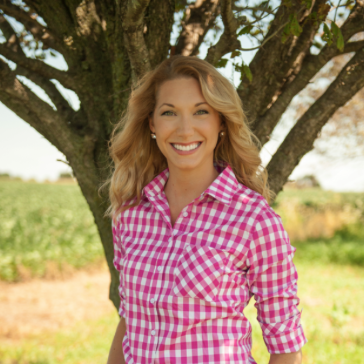Interview with Maureen Wilson of The Speech Bubble SLP

Maureen Wilson, M.S., CCC-SLP, is an ASHA certified, school-based speech language pathologist and Certified Autism Specialist. She has had experience with a variety of disorders and programs. Maureen graduated from Indiana State University in 2009. She has presented at the local, state, and national level and is the author of the blog The Speech Bubble SLP™.
Note: You should consult with your doctor or speech pathologist for recommendations on treatment. The views and opinions expressed in this article are those of Maureen Wilson and do not necessarily reflect the official policy or position of SpeechPathologyMastersPrograms.com
What inspired you to start The Speech Bubble SLP?
When I started working, my setting was a bit of a unique mix compared to other buildings in my district. Yes, other SLPs could give me advice here and there, but since I was in a bit of a different environment sometimes questions still had question marks which lead me to search out answers. I decided to put my experiences and ideas on paper, so to speak, in hopes of maybe inspiring and supporting someone else who was in a similar setting or situation.
What do you hope readers get out of your posts?
My hope is that anyone who reads my posts can walk away with something practical, engaging, and a little bit of renewed passion. Whether it is an activity I talked about, resource I used, or even just an idea of their own that was sparked from the article. I truly believe we have the best job around, but after time that wonderful intensity and confidence we started with can dwindle from years of paperwork, evaluations, planning, etc. Our jobs are challenging. I want to be someone who has a space where SLPs can go and recharge their love of what we do.
What are the most important things to consider when creating effective speech materials?
Creating resources is one of my favorite things to do, it is truly a passion! It is also a lot more than putting cute clipart on a page with a fancy font and calling it a day. When I sit down to design a resource, I think about how I, as an SLP, would like something laid out because in the end I am going to be using it with my students too. What would an SLP want and need from a material to make it easy for them to use with their students but still effective and engaging for the kids to use? Also, you need to have a clear picture of the type of student the material is going to be for. That determines the amount of scaffolding and supports that the resource might need. I always want my resources to be as complete as possible so that SLP has everything they need to help make that student as successful as possible.
What aspects of speech-language pathology suffer most when too much time is needed to fill out paperwork or create materials?
Paperwork is a part of the job no matter what setting you’re in, but it seems that the amount in the school setting is heavier than others. Completing all the necessary paperwork for one student can take hours. Now multiply that times 30, 40, 50, etc. That time during the day just simply isn’t there for most SLPs so they sacrifice time to plan for sessions, research new strategies, and find appropriate materials. They sacrifice having a time for lunch or taking a sick day in the name of paperwork. Ultimately, we can lose the ability to give our students the attention they deserve to be as effective as possible as SLPs.
How does your caseload in a given year affect your approach and the materials you use?
Oh my, the dynamic of a caseload dictates everything! I have had years where the bulk of my caseload was 3rd-5th grade students and it showed in my resources that year. I was reaching for more activities to mimic what my students were being exposed to in the classroom and less ‘cutesy’ activities. Older students in speech aren’t interested in making that cute paper plate sun you saw on Pinterest. So it is listening to them about their interests and finding ways to bring it into sessions to engage them. There were also a more than a few Google searches that year about behavior support ;). Then I have had years where it was more kindergarten to 2nd grade. Younger students need a different approach when it comes to session structure and engagement. They thrive on shorter, more intense bursts of work paired with something hands on to help connect the concept we are focusing on. They can’t sit and attend for 30 minutes like a 5th grader can, but sometimes even that can be a lot.
What is your advice to SLP graduate students?
You can do it! Grad school is tough, that is no secret, but it is also only the tip of the iceberg of our profession! You can get an amazing foundation in school and then the experiences you will have after really shape you as an SLP. Those moments can help guide you to where you want to be: a clinic, early intervention, hospital, school, working abroad, maybe even having your own practice! So be patient, be positive, and remember why you chose this profession. You can do it!

